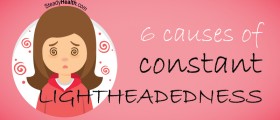
Dizziness General Characteristics
Dizziness may be defined as impairment in the spatial perception and one's stability. It is commonly used to describe two sensations, lightheadedness and vertigo. In lightheadedness one may feel he/ she is going to faint. There is no feeling that the objects from the surrounding area are moving. Lightheadedness can withdraw once the person lies down. On the other hand, vertigo is a bit different felling. In vertigo one feels that the surrounding is moving even though it does not. People who experience vertigo may also feel nausea and vomit. Additional problem is related to walking and standing so there is frequent loss of balance and consequent falls.
Dizziness affects older people more than other groups. It may interfere in daily activities and cause falls and serious injuries.
Causes of Constant Dizziness
Apart from being the type of dizziness, vertigo is most definitely the leading cause of dizziness. The problem in vertigo is closely related to dysfunction of the vestibular system of the inner ear. Vertigo typically affects people suffering from paroxysmal positional vertigo and vestibular migraine and it is also one of the symptoms of Meniere's disease and vestibular neuritis.
Disequilibrium is another cause of dizziness. It features with a sensation of being off balance. Disequilibrium leads to repeated falls.
Presyncope is introduction to an actual syncope. Syncope is a condition in which the patient briefly loses consciousness. Presyncope is always accompanied by lightheadedness. It commonly occurs due to lack of oxygen or it may be a consequence of abrupt drop in the blood sugar level.
Rapid and sudden changes in blood pressure are another causes of constant dizziness. If the blood pressure suddenly drops the brain becomes deprived from sufficient supply with blood and this consequently leads to severe dizziness. In this case dizziness may be alleviated if one sits or even lies down.
Apart from the previously mentioned, there are several more causes of constant dizziness. Dehydration is only one. Dizziness typically affect people suffering from severe dehydration. Accompanied symptom is weakness and one may even faint. Furthermore, stress may also induce dizziness. Permanent exposure to stress results in improper brain functioning. This may cause weakness and constant feeling of wooziness. Anemia is another condition which, if severe enough, may lead to dizziness. Rapid loss of blood always causes sudden dizziness while constant dizziness may affect people who have been suffering from anemia for a longer period of time. And finally, dizziness may be only one of the symptoms of migraines, circulatory problems, hormonal imbalance, and sudden changes in posture or occur as a side effect of certain medication.

















Your thoughts on this
Loading...